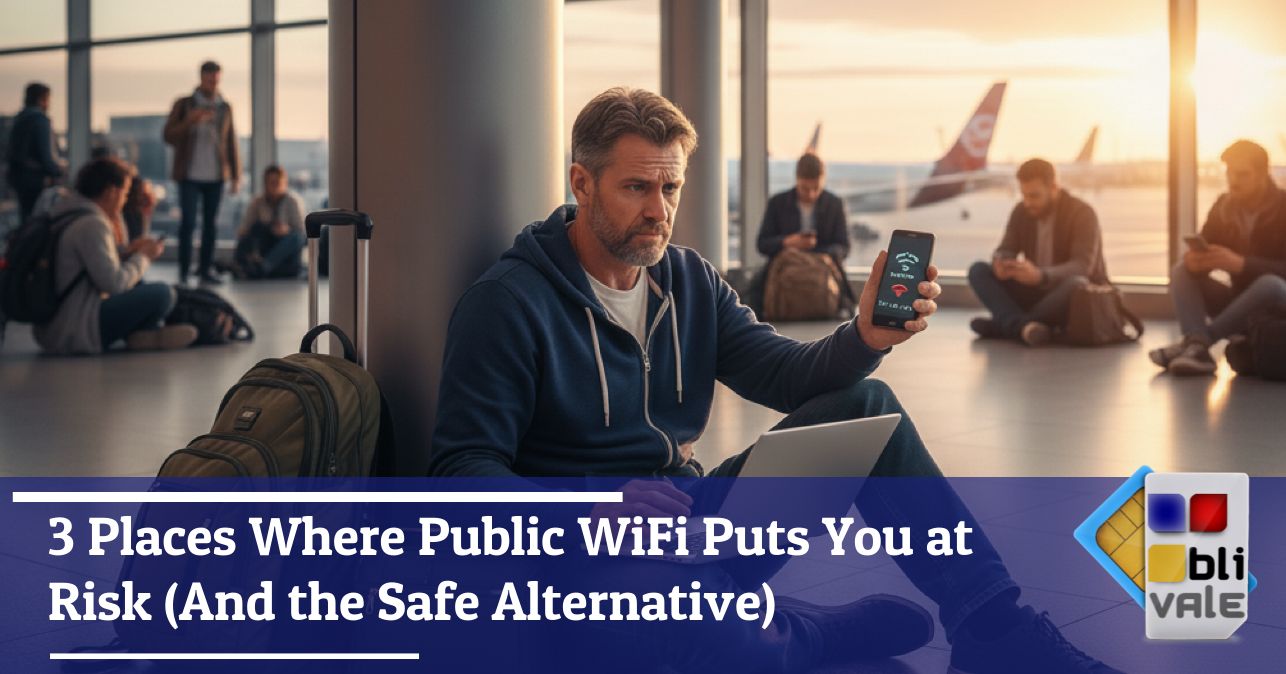Have you ever found yourself in a crowded airport, on an urgent work call, only to find the free WiFi incredibly slow or non-functional? Or arrived at a remote hotel where the promised connection only exists on paper? The truth is that connectivity in transit and remote areas is often unpredictable, as business and leisure travelers know only too well. In this article, you'll discover how much you can really trust public networks and which alternatives guarantee a stable connection wherever you are.
The reality of connectivity in public places
Connectivity in airports, hotels, and remote areas varies greatly and is rarely 100% reliable. At airports, free Wi-Fi is often overloaded by the number of users connected simultaneously, with speeds plummeting during peak hours. In hotels, quality depends on the infrastructure: modern chains offer decent connections, but smaller or remote properties may have limited or unstable bandwidth.
In remote areas (mountains, countryside, small islands), traditional mobile coverage may be absent or limited to 3G. WiFi, when available, relies on satellite connections or slow landlines. Furthermore, public networks pose security risks: they are open, unencrypted, and vulnerable to interception or man-in-the-middle attacks.
Bottom line: You can find free internet, but it's rarely fast, stable, or secure when you really need it.
Why public networks aren't enough
Airports: Too many users, too little bandwidth
Airports offer free WiFi, but with obvious limitations. Thousands of passengers connect simultaneously, especially in waiting areas. The result: slow speeds, dropped connections, and the inability to make video calls or download large documents. Some airports offer premium WiFi for a fee, but it costs as much as a daily data plan.
Hotel: fluctuating quality
Hotel connectivity depends on the category and location. International chain hotels in cities often have fast and stable Wi-Fi. Smaller properties, farmhouses, or hotels in less-served tourist areas may have:
Limited bandwidth shared among all guests
Weak signal in rooms far from the router
Need to require passwords that change every day
Extra costs for "premium WiFi"
Remote areas: no or obsolete coverage
In the mountains, countryside, nature parks, or on smaller islands, mobile coverage is often nonexistent or limited to outdated technologies (2G/3G). Local Wi-Fi, when available, relies on expensive and slow satellite connections. This makes it impossible to work remotely, stream content, or even use maps and messaging services.
Security: The Achilles' Heel of Open Networks
Public WiFi networks don't require strong authentication and don't use advanced encryption. This means that:
Your data can be intercepted
It is easy for an attacker to create a fake hotspot with the same name
Your login credentials to sensitive services are at risk
If you are thinking of taking a trip alone or with friends or for work, do not forget the importance of staying connected wherever you are. For unlimited Internet connection, contact BLIVALE where you can get unlimited Internet according to the destinations:
For unlimited plans like data BLIVALE guarantees free roaming anywhere in the world, no additional or hidden costs. Don't let the lack of connection stop you; get ready to explore the world with freedom and spontaneity.
How to ensure a reliable connection everywhere
1. Use a dedicated international eSIM or SIM card
The most reliable solution is to have a mobile data connection independent of Wi-Fi. International eSIMs allow you to connect to local roaming networks in hundreds of countries, with much wider coverage than public Wi-Fi. Advantages:
Always online, even without WiFi available
Encrypted and secure connection
No dependence on public infrastructure
2. Check mobile coverage before leaving
Check which local operators have coverage at your destination, especially if you're traveling to remote areas. International eSIMs like those from BLIVALE rely on multiple local networks, ensuring you get the best coverage available.
3. Bring a mobile router (MiFi) as a backup
If you travel frequently in a group or need to connect multiple devices, a portable 4G/5G router with a dedicated SIM card can be a convenient solution. Share your connection securely with your team or family.
4. Use a VPN when connecting to public WiFi
If you must use public WiFi, always activate a VPN (Virtual Private Network) to encrypt your traffic and protect yourself from interception. This is a minimum security measure.
5. Download maps and offline content before you leave
To reduce your connection dependency, please download in advance:
Offline maps
Travel documents, tickets, reservations
Entertainment content (music, podcasts, videos)
6. Check hotel reviews for connectivity
Before booking, read reviews on sites like TripAdvisor or Google Maps: many travelers report WiFi issues. This helps you choose properties with reliable connections if you need to work.
BLIVALE: the solution to stay connected everywhere
If you want to avoid surprises during your travels, BLIVALE offers international eSIM and SIM cards with unlimited free roaming in over 200 countries and regions .
Activate your eSIM in seconds, manage everything from the app, and stay connected wherever you are: airports, hotels, mountains, remote islands. No need to rely on slow or unsafe public Wi-Fi.
No hidden costs, no hassle —just simple, reliable, and secure connectivity. Perfect for digital nomads, business travelers, and families on vacation.
👉 Discover the BLIVALE plans and choose the freedom of always being online.
Conclusion
Connectivity in airports, hotels, and remote areas is often unreliable, slow, and insecure. Relying solely on public Wi-Fi means risking being offline at crucial moments. The solution? Have an independent mobile data connection, such as an international eSIM.
With BLIVALE, you can stay connected anywhere , without having to rely on unpredictable public networks. Activate your eSIM now and travel with the security of always being online.
📲 Try BLIVALE today and discover the freedom of limitless connectivity.









